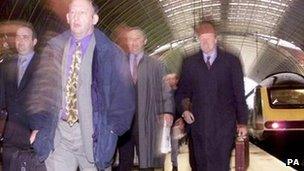Wales rail electrification extension 'to boost economy'
- Published

The electrification of the line will shorten journey times for commuters
The electrification of the rail line to Swansea and the south Wales valleys will give a significant boost to the Welsh economy, say politicians.
The Department of Transport's decision followed heavy lobbying after the announcement last year to electrify the line no further than Cardiff.
Shadow Welsh Secretary Owen Smith MP said it was "excellent news for Wales."
The Federation of Small Businesses welcomed the move but warned that it would not benefit north Wales.
Mr Smith congratulated the UK government "for having the foresight to invest in our rail network" and paid tribute to those who had campaigned for the full electrification of the Great Western Line to Swansea and the full set of valleys lines.
"Particular mention should go to the Welsh government minister, Carl Sargeant, and his team, for the work they undertook in making a rock solid business case for this investment," said Mr Smith.
Andrew RT Davies, leader of the Conservatives in the assembly said the decision would "prove incredibly beneficial to the Welsh economy".
'Priceless boost'
"Electrification to Swansea and across the valleys lines will provide a priceless boost to both the region and Wales as a whole," he said.
David Phillips, Swansea council leader said it showed major confidence in the city and would encourage inward investment.
"This will lead to more vibrancy and connectivity at Swansea railway station and will mean quicker journey times to places like Cardiff and Bristol and better access to the major London markets," said Mr Phillips.
"It will help people commuting back and forth for work and will raise Swansea's profile as a modern home for 21st Century business."
Geraint Davies, the Labour MP for Swansea West, said the decision was important "for the future of the Swansea brand".
Peter Black, Liberal Democrat AM for South Wales West, added: "Local business people, academics and politicians of all persuasions have worked together to make this happen and I am pleased that the government listened to them".
Plaid Cymru MP Jonathan Edwards MP said: "Electrification will make our transport network cheaper, greener and more efficient, and we must make sure that those benefits are available not just in south Wales, but in west Wales, mid Wales and north Wales as well.
'Continue to lobby'
"However, this will only mean that we have caught up with our rightful position, not taken any advantage."
Janet Jones of the Federation of Small Businesses, welcomed the decision but warned:
"There are also still parts of Wales, including in the north, which won't benefit from this investment and it's important that we continue to lobby to ensure that connectivity in all parts of Wales is as progressive as possible so that the whole of Wales is seen as open for business."
Swansea businessman David Jones said there had been a feeling in the city of being left behind, socially and economically, after last year's decision to electrify the rail line just to Cardiff.
"It's not about transport times it's about the perception not just for people who use the station here but also for inward investors," said Mr Jones, a senior manager with Wolfestone, a translation company which employs 28 people in the city centre.
Mr Jones said the extension to Swansea was an important box that had been ticked, but introduced a note of caution.
"It gives businesses a level playing field with which to attract business with which to succeed," he said.
"It is important but there are other boxes that need to be ticked.
"We shouldn't get too carried away."
Cardiff council leader Heather Joyce said electric trains were quicker, quieter, and better for the environment.
"Having rapid and reliable rail links between London and south Wales is critical to the continuing development of the city region," she said.
"Ultimately it's going to be very important to the future growth of the economy in the Cardiff city region and the rest of south Wales.
- Published16 July 2012
- Published16 July 2012
- Published13 July 2012
- Published12 July 2012
- Published23 May 2012
- Published11 May 2012
- Published11 March 2012
- Published24 June 2011
- Published1 March 2011